Countries with No Property Taxes Where You REALLY Own Your Home
April 11, 2025
When in 1848, influential thinker John Stuart Mill said, ‘landlords grow rich in their sleep, without working, risking or economising’, he did so as a critique of profits he felt should belong to the community and not the individual.
Here at Nomad Capitalist, we frequently discuss the idea that governments thrive on taxing the ‘evil rich,’ so it seems the spirit of Mill lives on when it comes to modern-day property taxes.
Such conversations inevitably raise the issue of whether property taxes stifle investment in real estate or are justified in giving the government its slice of the cake.
Property taxes are not universal. So, we believe that high-net-worth individuals and nomadic entrepreneurs are entirely justified in looking beyond their borders to find countries that offer something better.
If you’re in that camp, you’ll be interested in learning which countries welcome people who want to internationalise their lives without paying high property taxes.
In these places, more enlightened governments realise the value investors and entrepreneurs bring to an economy with their capital, skills and work ethic.
So, they’ve created environments that reward investment and business development by offering perks like no property taxes within their borders.
Sure, there are governments that will tax property until the end of time. But there are also countries with zero property taxes where you truly own your property. Helping you discover them is where our team at Nomad Capitalist comes in.
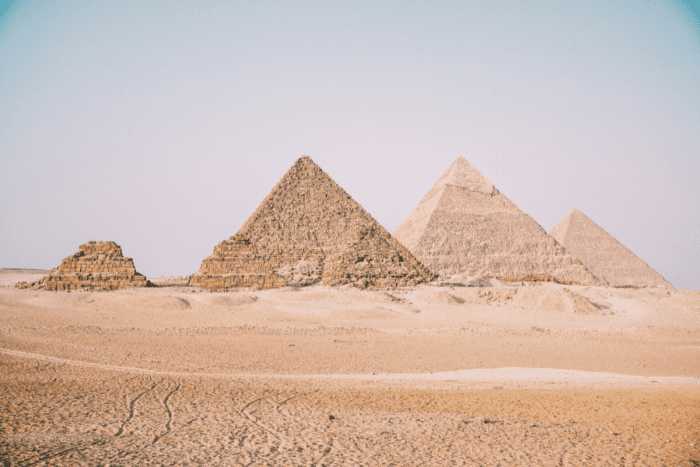
The Origins of Taxes on Property
As far back as ancient Egypt, Babylon and Persia, countries have used property taxes to collect money from the wealthy.
Since the majority of their populations were poor, those governments demanded money from the wealthiest landowners based on the productivity of their land.
After a good harvest, the local tax collector would happily take his piece of the action. Since tax assessors and tax collectors were normally one and the same, landowners had little choice but to hand over part of their hard-earned bounty.
In ancient Egypt, for example, taxes were levied against a land’s production of grain, as well as cattle output.
Though much of the population was illiterate, there were enough willing scribes around to devise one of the earliest tricks known to government tax collectors – keeping records of who owned which property for the express purpose of taxing it.
These tax scribes were among the most important members of their societies.
Taxes were so systematic and oppressive in ancient Egypt that the poor and wealthy alike crafted creative ways to avoid them.
Many wealthy Egyptians paid people to perform their mandatory physical tax duties, which typically involved doing physical labour for the state.
Likewise, in death, they utilised magic tools known as Ushbatis to serve them in everything from tilling fields to performing their tax service in the afterlife.
That’s right – the government was so ‘good’ at collecting taxes that people feared they might even reach them beyond the grave.
Today, of course, the situation is much the same, though admittedly, the methods are more sophisticated.
What is Property Tax?

Taxes are a reality of life for almost every property owner in the world.
Property tax is assessed on real estate by the local government based on the value of the property (including the land) you own.
In the United States, some homeowners pay five-figure sums every year to live in modest homes in places like New York and Southern California.
As if insane real estate prices and the cost of living in the United States weren’t enough, the government then tries to take more of your cash for simply owning property.
Harking back to ancient Egypt, these mandatory tithes to the government are proof that you don’t officially own your home or land. Rather, you are indebted to the government for the use of that land and, consequently, must pay for that pleasure.
In fact, it’s your responsibility to pay property taxes by the due date every year and never be a minute late.
If you own property in the Western world, not only have you taken a long position on your government’s declining currency, but you’ve effectively signed up for a lifetime of indentured servitude.
For all your government’s efforts to promote home ownership over renting, the reality is that property owners are the biggest renters of all.
Should you choose to become a Nomad Capitalist client, we’ll consistently encourage you to ‘go where you’re treated best’ and carefully craft your financial plan.
It’s certainly vital when it comes to owning a property.
We actively discourage people from buying real estate in the United States. In addition to all the other reasons, high property taxes are one of our primary concerns.
Sure, you could go from one bankrupt state to the most free state in the US, but that’s no better than catching a falling knife.
When North Dakota, allegedly one of the freest states in the US, voted overwhelmingly not to do away with the state’s property tax, we learned everything we needed to know.
A total of 66% of residents there voted ‘no’ at a time when the state’s coffers were already overflowing with revenue from oil activity.
Looking for states with no property tax is a typical move, while the smart move would be to look for countries with no property tax.
Owning real estate in fast-growing safe-haven jurisdictions offers better yield and appreciation potential. There’s also the potential for significantly lower property taxes or none at all.
Not only is foreign real estate owned in your own name – a non-reportable asset for US persons – but it also offers many other benefits, as long as you can keep ownership costs low.
Countries with No Property Tax
Yes, there are countries out there with no property taxes.
If you were to tell that to a US politician, they’d likely speculate that if such a thing happened there, the schools would all shut down and people wouldn’t be able to get an education.
To them, a charge of US$28,000 per year in Washington DC, or US$21,000 a year in New York, isn’t enough to offer education. This is the crux of owning real estate in a country that charges you for the pleasure – they can never take enough money from you.
Moreover, since they know they can depend on your money via these property taxes, politicians often have less incentive to find more reasonable ways to pay for schools, roads and other public works.
However, things are beginning to change.
Many countries, specifically those that are engaged in expanding their economy and attracting more attention on the international stage, realise that if they want to grow, they need to create an environment that’s attractive to investors and property owners.
Here at Nomad Capitalist, we’re all about finding the best options for you. So, here’s a list of regions and countries with no property taxes where you can actually own your home.
No Property Tax Countries in Europe
Although many European countries are known for their high taxes, a few of them take a different approach and do not levy a property tax.
Croatia

In a country where more than three-quarters of the population own their own homes, the impact of property taxes was significant and long-lasting.
However, in 2017, after a public outcry that led to a national campaign, an anti-property tax lobby succeeded in removing property taxes. Previously, they were 5% across the board, but these taxes were dropped a year later.
It’s important to note that despite the absence of property taxes, Croatia still charges tax on property transactions, such as the sale of a home. However, even this 3% rate found itself under fire in 2020 when a proposal to have it removed was brought before parliament.
So, the property tax debate is still very much a live issue there. If you’re interested in exploring Croatia’s residency by descent program, we cover it here.
Liechtenstein

Liechtenstein has no property taxes, but notional income on the net value of the property is subject to income tax. There is no real estate tax for corporations, either.
However, the sale of a real estate share in a Liechtenstein company or real estate in the country is subject to capital gains tax.
Monaco

An absence of property taxes has made Monaco’s glistening shoreline and luxurious homes, already a prime target for high-achieving entrepreneurs, even more attractive.
If you’re lucky enough to own a property there and wish to rent it out, be aware there’s a 1% tax, though it’s payable by the tenant.
Overall, Monaco is firmly on the list of countries with no taxes at all, making it a long-running favourite playground for the wealthy.
If you’re interested in finding out more about residency and citizenship in Monaco, our guide has all the details.
Malta
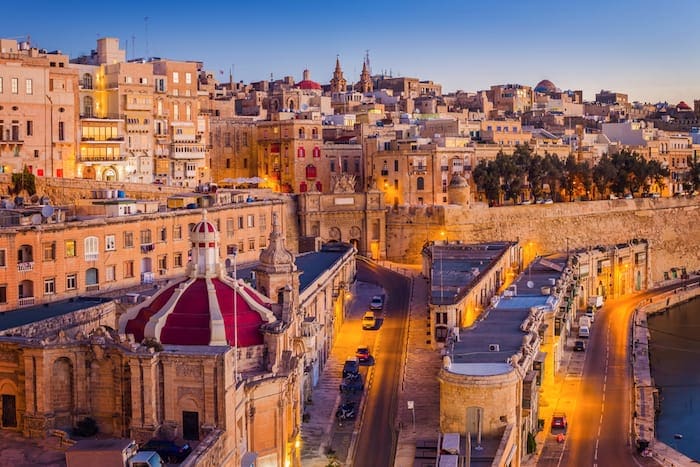
The island is particularly popular among expats as it’s a jurisdiction that offers all the benefits of a European lifestyle with powerful incentives for property owners and investors.
These benefits include no property tax, though the country does assess a stamp fee in lieu of property tax.
Malta continues to gain the attention of entrepreneurs who see EU residency as a key part of their internationalisation plan. Take a look at our guide to Malta’s unique naturalisation program to see how you can get fast citizenship.
Georgia

Thanks to its free economic policies and low taxes, Georgia is one of the most business-friendly countries in the world.
Nomad Capitalist’s founder, Andrew Henderson, owns several properties in Georgia and doesn’t pay property taxes on any of them. In fact, most people there don’t pay property taxes.
However, there is a caveat: if you make more than 40,000 GEL (about US$15,000) per year through Georgian-sourced income, then you’ll need to pay a small annual property tax of 0.05% – 1%, depending on your annual income.
On the other hand, if you don’t have any Georgian-sourced income, then you won’t pay any property tax. An added benefit here is that Georgia doesn’t charge any kind of transfer tax or stamp duty.
No Property Tax Countries in Oceania
Outside Europe, there are several interesting countries with no property tax. Some of these are tropical island nations that might interest anyone looking to escape the daily grind.
Fiji

Fiji does not assess property tax on freehold land. However, less than 10% of all land in Fiji is freehold, much of it set aside by the British to entice farmers to come and produce agricultural goods.
Despite that, many people feel Fiji real estate is one of the best investments in the region.
Owning land in Fiji is a relatively straightforward way to get permanent residence. Fiji also has a territorial tax system that allows residents to pay no tax on income earned outside of the country, such as through an offshore company.
Fiji is a favourite real estate investment destination for many as it boasts competitive rates relative to the Pacific and is also a major tourist destination.
Cook Islands
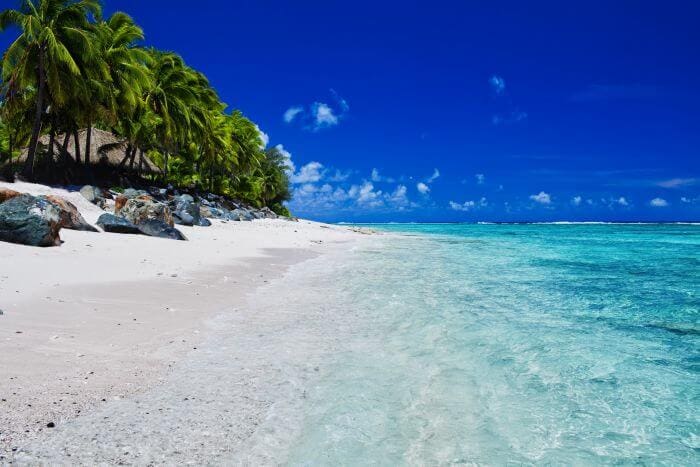
In addition to no wealth or capital gains taxes, the Cook Islands in the South Pacific doesn’t assess property taxes.
This island chain, in free association with New Zealand, has gained attention for its asset-protection trusts and policy of having no property tax.
However, land cannot be easily owned by foreigners in freehold form. Instead, the government requires property leases to be held by non-Cook Islanders, with such leases lasting up to 60 years.
This semi-sovereign island chain may become more important for real estate in the future, but for now, at least, it may present too many challenges for foreign investors despite its ‘Pacific paradise’ draw.
No Property Tax Countries in the Caribbean
Like Oceania, a number of island nations in the Caribbean also forgo property taxes.
Cayman Islands

To no one’s surprise, the Cayman Islands makes the list. Home to one of the world’s largest and most sophisticated offshore sectors, the country has no income or property taxes.
In addition, the Caymans has no capital gains taxes, corporate taxes, payroll taxes or withholding taxes on domestic or foreign entities.
In other words, the Cayman Islands is very friendly to investors who want to own a piece of this Caribbean property market.
Property prices seem to be rising – especially along the main areas of Seven Mile Beach – as a result of luxury developments and increased demand.
These islands are among the most developed in the Caribbean, boasting excellent beaches and good business infrastructure, although the cost of living can be high.
Dominica
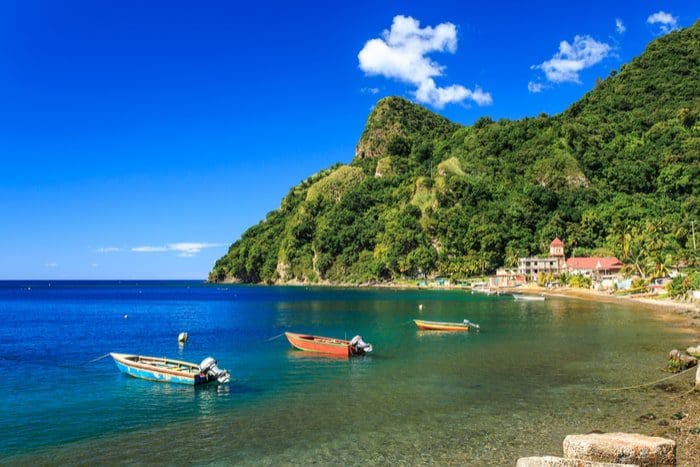
Dominica has no taxes on non-residents and is a major contender in the second citizenship bracket, offering one of the most cost-effective citizenship-by-investment programs available.
This Caribbean Island nation, known as the ‘nature island’, is English-speaking, having obtained independence from the United Kingdom in 1978.
One thing to note is that municipal taxes are levied on properties in Roseau and the Canefield urban areas. Otherwise, there are none of the traditional property taxes associated with most nations.
Turks and Caicos
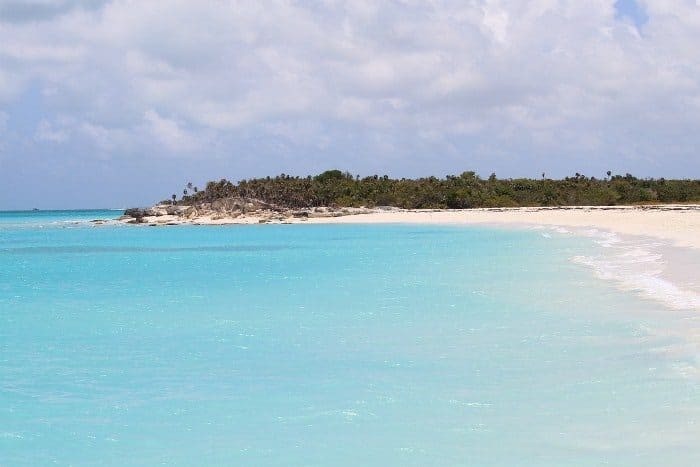
There is no property tax in the Turks and Caicos, but there is an annual stamp duty, which is on a progressive scale.
Turks and Caicos, a British Overseas Territory, is also on our list of 25 tax-free countries where you can get a second residence and is generally worth considering, not only from a financial incentive standpoint but for its excellent lifestyle.
The luxury real estate market there is generally booming and is an attractive opportunity to diversify any investment portfolio.
No Property Tax Countries Asia and the Middle East
With fast-developing markets and oil-rich countries with rates, these jurisdictions in Asia and the Middle East do not levy property taxes.
United Arab Emirates (UAE)

Dubai, the most populous city in the UAE, has no annual property tax. Although, it does impose a one-time property transfer fee of 4% upon the purchase of a property.
Additionally, as well as 9% corporate tax on many companies, Dubai imposes a 5% ‘housing fee’ on the annual rental value of properties and a 5% fee on rental income.
Other municipalities in the UAE may impose their own specific fees.
Though not as tax friendly as it once was, the UAE is home to some of the most innovative real estate projects and is arguably still the most welcoming country in the Middle East for international investment.
Gulf Countries

Other Middle Eastern countries like Bahrain, Kuwait, Oman, Qatar and Saudi Arabia are all property tax-free. While some Westerners may not pay much attention to opportunities in this region, there are few, if any, taxes on anything.
The region presents challenges for foreigners in terms of cultural adjustment and ownership rules.
Kuwait, for example, does not allow foreign ownership except for nationals of other Gulf Cooperation Council (GCC) countries. Saudi Arabia restricts non-Muslims from ownership in the holy cities of Medina and Mecca.
Regardless, no property tax is a huge benefit for those looking to reduce their financial burden.
The Catch: Stamp Duties
Before you hop on a plane or dispatch a real estate agent to buy a home in a country with no property tax, you should consider another levy on property purchases – stamp duties.
Some governments levy a stamp duty, also known as a real estate transfer tax, on all property purchases. Essentially, when you buy the property, you pay a percentage of the purchase price to the government as a charge on the transfer of ownership.
This isn’t always the worst thing in the world. When Nomad Capitalist founder Andrew Henderson bought an apartment in Malaysia, for instance, he paid a stamp duty of about 3% of the value of his purchase.
While that raised his apartment’s initial price tag, he considered the charge well worth it, as he only paid around US$400 in property taxes per year.
In other countries, it may be a different story.
When investigating buying property in Barcelona, the Nomad Capitalist team initially found that real estate there was surprisingly cheap. However, further digging revealed why properties were so cheap – buyers had to pay an extra 8% to 10% in stamp taxes on top of property taxes to the Spanish government.
Of the 12 countries and regions mentioned in this article, the following levy a stamp duty on all property purchases:
- Monaco: One-time transfer duty (4.5%–7.5%) when purchasing properties
- Malta: 5%
- Cayman Islands: 7.5%
- Dominica: 2.5% (seller); 2% (buyer)
- Turks and Caicos: 0%–10%
- Bahrain: 1.7%–2%
- Oman: 3% property transfer fee.
As you can see, some of these stamp duties are minimal and others quite substantial. So, you’ll need to factor this into your decision when purchasing real estate in any of these countries.
However, since the stamp tax is a one-time payment, it’s usually a better deal than paying an annual property tax.
There are relatively few countries that truly have no property tax. Many have merely allowed property owners to pay a front-loaded sum in the form of stamp duty or another fee that eliminates the need for ongoing property taxation.
Given a choice between two evils, we’d rather pay an up-front fee and be able to limit our costs going forward.
At least in countries with no property taxes on an annual basis, you get to keep more of your own money. That’s something most governments don’t want you to do.
Property Taxes: FAQs
It’s suggested that New Jersey is the state with the highest property tax rates on average. The rates vary depending on the county, but the average rate is equal to 2.23% of a property’s value, according to the Tax Foundation.
Hawaii is regularly cited as the state with the most affordable property taxes. It’s reported that an effective rate of 0.31% is charged there.
Many countries labelled as ‘tax havens’ do charge small property taxes here and there. If it’s not mentioned in the list above, it’s likely that property tax is charged.
A property tax declaration is a formal document that provides information about a property’s value and the amount of tax due on it.
Monaco, Liechtenstein, Fiji and Dominica are some of the most eye-catching nations to legally avoid property taxes.
Buy Property Where You’re Treated Best
Many people are interested in investing in property overseas, but they are worried about high transfer taxes and property taxes.
After all, if you have to pay a lot of money to the government every year, you don’t really own your home.
A lot of countries that people look to invest in – for example, those in the European Union – have stamp duties and transfer taxes. But you’re also required to pay the government hefty sums in the form of property taxes.
At Nomad Capitalist, our team conducts extensive research on our target markets around the world, helping clients buy, rent and sell their properties seamlessly.
We’ll help determine your best options as part of a personalised and legal offshore plan. If you’re interested in high-yield and high-appreciation real estate opportunities, apply to become a client.



Does Puerto Rico Pay Taxes to the US?
It’s a common question and one that often fuels confusion, debate, and a fair share of misinformation – Do residents of Puerto Rico actually pay US federal taxes? When most people think of US tax obligations, they naturally assume they apply uniformly across all US citizens. But when it comes to Puerto Rico, things are […]
Read more

Zug Canton Taxes: The Ultimate Destination for Wealth Management in Switzerland
Switzerland’s global reputation is built not just on stunning views of Alpine peaks and serene lakes but also on a foundation of exceptional quality of life, world-class infrastructure and investor-friendly tax policies. The results speak for themselves: efficient public transport seamlessly links cities and villages; the standard of living regularly ranks among the highest in […]
Read more

How Smart Investors Use Venture Capital to Build Wealth
Big companies like Google, Amazon, Facebook and Apple all started out as bold ideas backed by venture capital. Decades later, the same firms are household names, as familiar to most people as electricity, the internet, or the telephone. But hindsight is a fickle friend. The truth is, it wasn’t always so obvious they’d succeed. These […]
Read more




